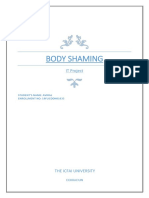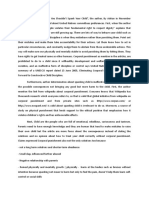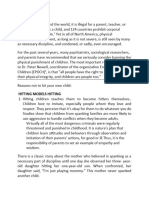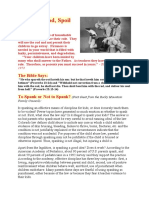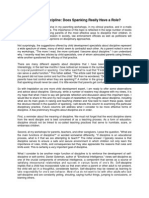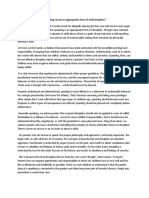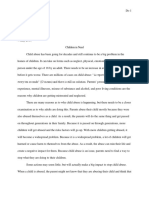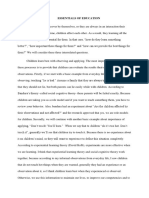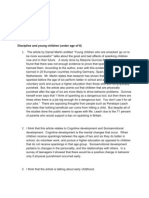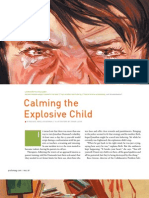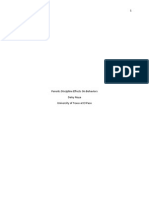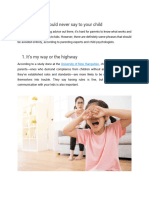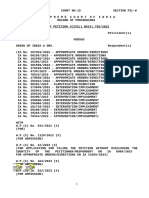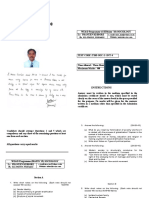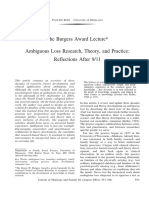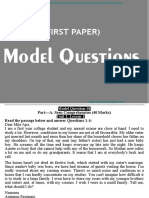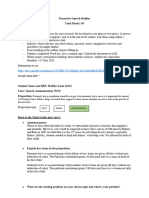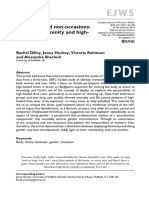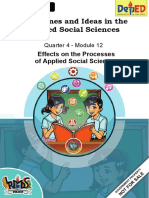Outline For Spanking Child
Outline For Spanking Child
Uploaded by
std_11869Copyright:
Available Formats
Outline For Spanking Child
Outline For Spanking Child
Uploaded by
std_11869Original Title
Copyright
Available Formats
Share this document
Did you find this document useful?
Is this content inappropriate?
Copyright:
Available Formats
Outline For Spanking Child
Outline For Spanking Child
Uploaded by
std_11869Copyright:
Available Formats
Outline
Topic: Is Spanking Children for discipline Effective or not? Specific Purpose: To persuade my audience that non-physical forms of discipline are more ethical and effective. Thesis Statement: Use of corporal punishment as child discipline is both unethical and ineffective. Hitting or spanking a child will only teach them violence. If the child does learn to behave it is only out of fear. It is more effective to explain to the child why their behavior was wrong and devise a reasonable punishment
INTRODUCTION
The topic of spanking has been a frequent debate. Although most experts advise against it, many parents still report that they use spanking to discipline their children. Its important to examine some of the potential consequences of spanking when establishing discipline strategies.
BODY
I. Spanking Children dont always know what is right and what is wrong and need to be taught in a healthy manner. Spanking as a punishment can occur in a child's home, in public organizations, in schoolsor communities the child interacts with. In 29 countries around the world, it is illegal for a parent, teacher, or anyone else to spank a child. But in all of North America, physical punishment by a parent, as long as it is not severe, is still seen by many as necessary discipline
A. 1.
B. 1.
II. A.
Some parents think it is perfectly fine to spank your child. They claim that this is not child abuse and it is strictly parenting. When children are bad or get themselves in trouble, a parent is liable to step in and teach them right from wrong. Spanking is the most popular way for a parent to take control and get the childs attention (Moms vs. The World). Its not always about the spank itself says Kate Morrall, a writer for Parent and Child Magazine, Its more about scaring the child out of the act of doing it again in fear of the consequence. Some parents believe that the nonphysical forms of discipline, like time-out, do not work.
B.
C.
1.
III. A.
Is spanking effective? While spanking may relieve a parent's frustration and briefly stop misbehavior, according to the American Academy of Pediatrics , researchers suggest that spanking may be the least effective discipline method. To test this hypothesis, researchers surveyed parents with the assumption that if spanking worked, children who were spanked would learn to behave better over time so that they needed punishing less frequently. However, the results showed that families who start spanking before their children are a year old are just as likely to spank their four-year-old children as often as families who do not start spanking until later. (Debatable Issues) As a result, children appear not to be learning the lessons parents are trying to teach by spanking. Poor results may occur because spanking by itself does not teach an alternative behavior (American Academy of Pediatrics). In fact, children usually feel resentful, humiliated, and helpless after being spanked. The primary lesson they learn appears to be that they should try harder not to get caught. A poll was taken for Parent and Child Magazine to see peoples thoughts on spanking their kid. 36% said yes, it is effective and 64% disagreed. Spanking can also send the wrong message to children. A. It communicates that hitting is an acceptable way to solve problems, and that it is all right for a big person to strike a smaller one (Melissa Cotroll). Because children learn through parental modeling, physical punishment gives the message that hitting is an appropriate way to express feelings and solve problems. If a child does not observe a parent solving problems in a creative and humane way, it may be difficult for him or her to learn to do so for himself or herself (Jan Hunt). When children are spanked, they may know that they have done something wrong, but in many cases, they are too young to understand the lesson. It is a very difficult message for any adult or child to understand: "I hurt you because I don't want you hurt." (Debatable Issues) Spanking can be taken too far. A. B. In some cases, spanking can lead to other harmful ways of teaching a child a lesson. Some parents who are having a hard time will begin to lash out on their children and beat them for almost no apparent reason. In most cases, drugs or alcohol is involved, but in other countries it is looked at as an everyday thing (Melissa Cotroll). If people think it is okay to spank kids, are my kids teachers spanking them? What about when they go to daycare? (French, Nancy). A. Majority of parents claim that it is only okay for a parent to spank their own child and no one has a need to lay their hands on someone elses child in that manner.
1.
2.
3. B.
C.
IV.
B.
1.
2.
3.
V.
VI.
VIII. A.
Every parent will have a different view on spanking and discipline in general. If you ask me, as long as the child learns without getting hurt then it should be acceptable. I also dont think it is right for people to try to step in and tell another person how to parent. Another key point that I do not agree with is giving teachers, babysitters, daycares and other places in the community to spank another persons child. If a parent has all the right intentions for their kid and never spanks them to hurt them and at the end of the day doesnt feel as if the spank was used for anything other than to teach them, then yes, Id say it is okay.
B.
C.
CONCLUSION
Children who are spanked most are more likely to be aggressive and hit others.. Hitting children teaches acceptance of violence. While most of us who were spanked as children grow up to be healthy adults, spanking causes anxiety, contributes to feelings of helplessness and humiliation, and often provokes anger and a desire for revenge, feelings which have usually been repressed in adulthood but may lead to depression, adult violence, and hitting our own children. Effective discipline exists. It does not involve hitting and humiliating children.
You might also like
- Seclusions and Restraints Selected Cases of Death and Abuse at Public and Private Schools and Treatment CentersDocument62 pagesSeclusions and Restraints Selected Cases of Death and Abuse at Public and Private Schools and Treatment CentersShermanNo ratings yet
- Child Guidance Assignment One - FinalDocument10 pagesChild Guidance Assignment One - Finalapi-355203190No ratings yet
- kids are worth it! Revised Edition: Giving Your Child the Gift of Inner DisciplineFrom Everandkids are worth it! Revised Edition: Giving Your Child the Gift of Inner DisciplineRating: 4.5 out of 5 stars4.5/5 (19)
- Informative Speech On Spanking A ChildDocument2 pagesInformative Speech On Spanking A Childapi-512202267No ratings yet
- The Case For SpankingDocument3 pagesThe Case For SpankingPatricia LacsabaNo ratings yet
- Spanking Children Is A Form of DisciplineDocument1 pageSpanking Children Is A Form of DisciplineApril GllcNo ratings yet
- The Benefits of Physical PunishmentDocument2 pagesThe Benefits of Physical PunishmentAmb SesayNo ratings yet
- 3 2 08 Abuse Rampant in Juvenile Centers Across U SDocument2 pages3 2 08 Abuse Rampant in Juvenile Centers Across U SmocojaildocsNo ratings yet
- What Is Child Abuse and Neglect?Document13 pagesWhat Is Child Abuse and Neglect?ShafiqahFazyaziqahNo ratings yet
- Parenting and Corporal PunishmentDocument6 pagesParenting and Corporal PunishmentBrittany Wright PruittNo ratings yet
- Attachment Based Classroom Strategies: DR George Harris (Clinical Psychologist)Document51 pagesAttachment Based Classroom Strategies: DR George Harris (Clinical Psychologist)Anghel Roxana MihaelaNo ratings yet
- Research SexualityDocument83 pagesResearch SexualityAmelita Gilbuena TrayaNo ratings yet
- Body ShamingDocument8 pagesBody ShamingAviralAlokNo ratings yet
- Spanking Effective Discipline or Child Abuse (The Classical Argument)Document5 pagesSpanking Effective Discipline or Child Abuse (The Classical Argument)api-255329479No ratings yet
- Elc ArticleDocument3 pagesElc ArticleHAZIQ ZIKRI BAHARUDDINNo ratings yet
- Round Table PaperDocument6 pagesRound Table Paperapi-218368288No ratings yet
- Toddler Discipline: Proven Toddler Discipline Strategies for Stress & Guilt-Free ParentingFrom EverandToddler Discipline: Proven Toddler Discipline Strategies for Stress & Guilt-Free ParentingRating: 2 out of 5 stars2/5 (1)
- Toddler Discipline: Proven Toddler Discipline Strategies for Stress & Guilt-Free Parenting: Toddler Care Series, #1From EverandToddler Discipline: Proven Toddler Discipline Strategies for Stress & Guilt-Free Parenting: Toddler Care Series, #1Rating: 1.5 out of 5 stars1.5/5 (2)
- Why Parents Should Not Hit Their KidsDocument4 pagesWhy Parents Should Not Hit Their Kidshisajih342No ratings yet
- Is Spanking Okay 2Document3 pagesIs Spanking Okay 2FaithkruchowskiNo ratings yet
- Spanking 2Document7 pagesSpanking 2api-341195901No ratings yet
- The Spanking Fallacy, Moving Beyond the Dark Ages of Childhood DisciplineFrom EverandThe Spanking Fallacy, Moving Beyond the Dark Ages of Childhood DisciplineNo ratings yet
- Spare The RodDocument2 pagesSpare The RodSumedha GoyalNo ratings yet
- Perspectives On DisciplineDocument4 pagesPerspectives On DisciplineRommel Villaroman EstevesNo ratings yet
- Essay Example On BullyingDocument3 pagesEssay Example On Bullyingnurakmar_akma342420% (5)
- Literature ReviewDocument6 pagesLiterature Reviewapi-610725677No ratings yet
- Toddler Parenting Success: 2 Books in 1: Toddler Discipline + Toddler Potty Training for Effective Toddler Care & DevelopmentFrom EverandToddler Parenting Success: 2 Books in 1: Toddler Discipline + Toddler Potty Training for Effective Toddler Care & DevelopmentNo ratings yet
- Revision Essay ArgDocument5 pagesRevision Essay Argapi-252253725No ratings yet
- 13 Things Mentally Strong Parents Dont Do enDocument12 pages13 Things Mentally Strong Parents Dont Do enlavleen17No ratings yet
- The Socratic Method in Parenting Developing Critical Thinking at A Young Age - DeSCARGADocument7 pagesThe Socratic Method in Parenting Developing Critical Thinking at A Young Age - DeSCARGAJon Clay DescargaNo ratings yet
- To Spank or Not To SpankDocument3 pagesTo Spank or Not To SpankSzékely TimeaNo ratings yet
- Parents Should Attend Parenting ClassesDocument10 pagesParents Should Attend Parenting ClassesHareshan Sathis100% (1)
- Precis-The Connected ChildDocument3 pagesPrecis-The Connected ChildRay StillNo ratings yet
- Corporal Punishment in The HomeDocument5 pagesCorporal Punishment in The Homeapi-253752492No ratings yet
- Summary of No-Drama Discipline: The Whole-Brain Way to Calm the Chaos and Nurture Your Child's Developing MindFrom EverandSummary of No-Drama Discipline: The Whole-Brain Way to Calm the Chaos and Nurture Your Child's Developing MindRating: 1 out of 5 stars1/5 (1)
- Time-Out is Not Your Only Option: Positive Discipline for Every Child (that parents can feel good about)From EverandTime-Out is Not Your Only Option: Positive Discipline for Every Child (that parents can feel good about)Rating: 4.5 out of 5 stars4.5/5 (2)
- Spanking Can Be An Appropriate Form of Child DisciplineDocument3 pagesSpanking Can Be An Appropriate Form of Child DisciplineKathleen FrancoNo ratings yet
- Revised EssayDocument6 pagesRevised Essayapi-459044808No ratings yet
- Complete Annotated Bibliography FinalDocument6 pagesComplete Annotated Bibliography Finalapi-383723836No ratings yet
- Lit Review PaperDocument10 pagesLit Review Paperapi-708706092No ratings yet
- Essentials of EducationDocument3 pagesEssentials of Educationapi-450889765No ratings yet
- Topic Proposal FinalDocument2 pagesTopic Proposal Finalapi-272918687No ratings yet
- BrochureDocument3 pagesBrochureapi-282383249No ratings yet
- Helicopter Parents HomeworkDocument5 pagesHelicopter Parents Homeworkafmtfanym100% (2)
- RhetoricalDocument4 pagesRhetoricalapi-457938627No ratings yet
- Article 1Document2 pagesArticle 1sarelibarNo ratings yet
- PERFORMANCE TASK EnglishDocument4 pagesPERFORMANCE TASK EnglishJhun francis BisaNo ratings yet
- Calming The Explosive ChildDocument6 pagesCalming The Explosive Childdancingstars100% (3)
- Community Problem Final DraftDocument7 pagesCommunity Problem Final Draftapi-266196562No ratings yet
- Teachers and Mental Health: The Art of Accurate Speech and Other Ways to Help Students (Children) Not Become Psychiatric Patients.From EverandTeachers and Mental Health: The Art of Accurate Speech and Other Ways to Help Students (Children) Not Become Psychiatric Patients.No ratings yet
- Toddler Discipline: Effective Toddler Discipline Strategies to Tame Tantrums and Help Your Child Grow With Positive DisciplineFrom EverandToddler Discipline: Effective Toddler Discipline Strategies to Tame Tantrums and Help Your Child Grow With Positive DisciplineNo ratings yet
- How to Explain Transgender to Kids Using Simple Words: DEI Parent GuidebooksFrom EverandHow to Explain Transgender to Kids Using Simple Words: DEI Parent GuidebooksNo ratings yet
- Adair Formalpaper1Document7 pagesAdair Formalpaper1api-307374574No ratings yet
- Addis Ababa University: Department of Law Individual Assignment 1Document3 pagesAddis Ababa University: Department of Law Individual Assignment 1Amir sabirNo ratings yet
- Digitized Text Final Draft 2Document7 pagesDigitized Text Final Draft 2api-253375096No ratings yet
- Spanking Being An Effective Method of Disciplining ChildrenDocument2 pagesSpanking Being An Effective Method of Disciplining ChildrenAlfonso Nowel TabingoNo ratings yet
- 50 Things You Should Never Say To Your ChildDocument50 pages50 Things You Should Never Say To Your ChildNegash JaferNo ratings yet
- Preventing School Bullying-Exploratory Essay 1Document10 pagesPreventing School Bullying-Exploratory Essay 1api-308159368No ratings yet
- Research PaperDocument13 pagesResearch Papersheharyarasim99No ratings yet
- Chapter Nine: Concluding Remarks: Summary of Kinship and Affinal RelationshipDocument30 pagesChapter Nine: Concluding Remarks: Summary of Kinship and Affinal RelationshipWahdini PurbaNo ratings yet
- Digest PFRDocument6 pagesDigest PFRAlexis Amos PalomoNo ratings yet
- TOEFL Reading - Vocabulary QsDocument21 pagesTOEFL Reading - Vocabulary QslucianomatamataNo ratings yet
- Fourth National Incidence Study of Child Abuse and Neglect (NIS-4) Report To Congress 2010Document455 pagesFourth National Incidence Study of Child Abuse and Neglect (NIS-4) Report To Congress 2010Beverly TranNo ratings yet
- RA 11642-Domestic Administrative Adoption and Alternative Child Care ActDocument63 pagesRA 11642-Domestic Administrative Adoption and Alternative Child Care ActFaye MadrigalNo ratings yet
- Group and Family TherapyDocument16 pagesGroup and Family TherapyReyalyn AntonioNo ratings yet
- Gender Perspectives of Indian Family (p1 - p2)Document10 pagesGender Perspectives of Indian Family (p1 - p2)shubham singhNo ratings yet
- Academic Effects of Broken Families On Senior HighDocument6 pagesAcademic Effects of Broken Families On Senior HighMarielle QuirayNo ratings yet
- Instructional PlanDocument6 pagesInstructional PlanJuriel Michael Alap100% (1)
- Unit 3Document20 pagesUnit 3rizwan791436No ratings yet
- FAMILYDocument14 pagesFAMILYCarla Ann ChuaNo ratings yet
- JUVENILE DELINQUENCY AND JUVENILE JUSTICE SYSTEM ReviewerDocument32 pagesJUVENILE DELINQUENCY AND JUVENILE JUSTICE SYSTEM ReviewerKaren Angel Abao100% (3)
- Application of Adoption OrderDocument5 pagesApplication of Adoption OrderWard Chute100% (1)
- Arun Muthivel Vs Union of India and OrsDocument11 pagesArun Muthivel Vs Union of India and OrsAkhil BenNo ratings yet
- Revisionary Test Paper: FoundationDocument155 pagesRevisionary Test Paper: FoundationkapsicumadNo ratings yet
- Module 18 - InversionDocument7 pagesModule 18 - InversionKhánh Ngọc NguyễnNo ratings yet
- Resource ManagementDocument19 pagesResource ManagementLaura Mae AgustinNo ratings yet
- Indian Sociology Question PaperDocument3 pagesIndian Sociology Question PaperAkshay ThakurNo ratings yet
- Ambiguous Loss Theory Boss 2004Document16 pagesAmbiguous Loss Theory Boss 2004Bless Justine TanNo ratings yet
- CohabitationDocument4 pagesCohabitationGregory TumeNo ratings yet
- UAE4 School List4Document82 pagesUAE4 School List4Javeed MohiuddinNo ratings yet
- Family Law ProjectDocument10 pagesFamily Law ProjecttanayNo ratings yet
- HSC Book English Model QuestionDocument611 pagesHSC Book English Model QuestionDhiman Nath100% (1)
- SHS Humss Ucsp Q2 WK5Document5 pagesSHS Humss Ucsp Q2 WK5Tagayong KimberlyNo ratings yet
- The Leboyer Method - Is Considered A Psychological Method of Delivery That Aims atDocument2 pagesThe Leboyer Method - Is Considered A Psychological Method of Delivery That Aims attabiNo ratings yet
- Client Survey On Breastfeeding: HindiDocument3 pagesClient Survey On Breastfeeding: HindiShang DimolNo ratings yet
- Persuasive Speech OutlineDocument5 pagesPersuasive Speech Outlineftdf5bt5m6No ratings yet
- Occasions and Non-Occasions: Identity, Femininity and High-Heeled ShoesDocument16 pagesOccasions and Non-Occasions: Identity, Femininity and High-Heeled ShoesSylviany El NovitaNo ratings yet
- Life Change IndexDocument2 pagesLife Change IndexTapmeonce TapmeNo ratings yet
- Disciplines and Ideas in The Applied Social SciencesDocument28 pagesDisciplines and Ideas in The Applied Social SciencesCindy Kaye Fajardo100% (3)












